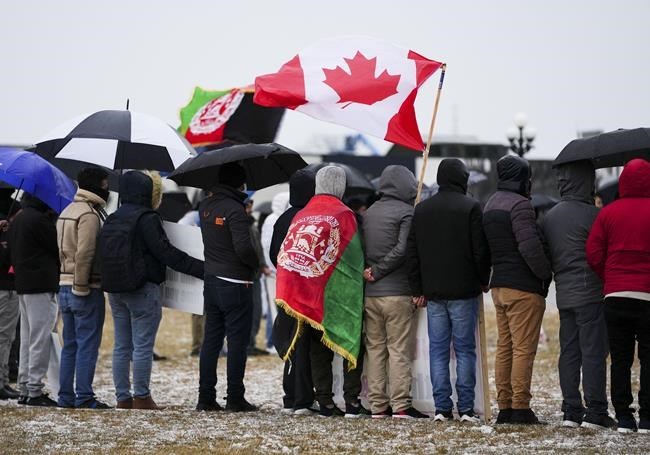OTTAWA — What began as a 30-day fundraising campaign to help Afghan interpreters flee the Taliban turned into a harrowing, chaotic and deeply frustrating eight-month effort for the Veterans Transition Network, and its executive director says it’s time for that to end.
The group started raising money last summer when the Taliban swept to power in Afghanistan, but executive director Oliver Thorne says no one anticipated how long it would be involved.
“This has sort of transformed from a crisis evacuation effort into a long-term migration effort,” said Thorne.
The network is ending its public fundraising on May 2, winding down operations over the next six months and returning its focus to mental health programming for Canadian veterans.
Non-governmental organizations led by veterans have been helping people who worked with the Canadian Armed Forces get out of Afghanistan and head to neighbouring countries, then on to Canada.
Thorne says “bureaucratic hoops” are making it difficult to help people get the proper paperwork and causing a bottleneck, and he’s calling on the federal government to resume consular services in Afghanistan.
“The ability to provide consular support in Afghanistan would alleviate a lot of these tensions,” he said. “That's where we're really seeing the bottleneck.”
Retired major general Denis Thompson is part of that grassroots network of veterans, refugee advocates and volunteers working to help people navigate the complex system of visas and other paperwork. He's on the Veterans Transition Network's board of directors and is an adviser to the board of Aman Lara, a Canadian NGO that's been running safe houses in Afghanistan.
He said about 700 people in Pakistan can’t get to Canada because they don’t have an exit visa from that country. Another 500 are ready to leave Afghanistan but there’s nowhere for them to go.
“They have the right documentation,” Thompson said. “The pipe is stuck, essentially.”
Around 450 of those who are in Pakistan have expired visas and would need to return to Afghanistan to renew them, putting them at further risk of reprisals from the Taliban.
Political upheaval in Pakistan after its recent elections may make it more difficult for Canada to negotiate changes to exit visa requirements, Thompson said, something he feels should have already happened.
“These are people that have already been employed by Canada that already put themselves in harm's way,” Thompson said. “I just find it a little bit odd that we don't put more emphasis on those that have helped us.”
Thorne said he’s also frustrated Afghans don't have “this extraordinary pathway” that’s been made available to Ukrainians fleeing the Russian invasion.
Both advocates feel the government needs to do a better job facilitating and funding the work of NGOs and humanitarian groups, but praised the efforts of the “hardworking people” at Global Affairs Canada and Immigration, Refugees and Citizenship Canada.
“A lot of this could have been delegated to officials who are willing to get the job done, but don't appear to have the legal tools to do it,” Thompson said. “So that's the part that frustrates me. And that's a ministerial responsibility.”
Sanctions prohibit Canadians from spending money in Afghanistan that will end up in the hands of the Taliban, either directly or indirectly, meaning requests for federal funding are stalled and operations within the country are limited.
In an open letter sent April 4 to the ministers of justice, public safety, foreign affairs and international development, nine humanitarian organizations including the Red Cross pleaded with the government to change this, noting that other countries have found a way to exempt humanitarian groups from sanctions.
“Examples of ‘indirect’ contributions could include paying taxes on staff salaries, something that is required of any organization that wants to continue operating in Afghanistan,” the letter read.
Added Thompson: “To be frank, a lot of the solutions to these problems are coming from the NGO sector, and the problems are coming from the government."
The federal government has pledged to resettle 40,000 Afghan refugees and so far more than 10,600 people have arrived in Canada. The departments of Foreign Affairs and Immigration, Refugees and Citizenship Canada did not respond to questions Monday.
The Veterans Transition Network says it has raised $4.6 million and helped 2,061 people get out of Afghanistan.
Thorne said the group will try to determine if another organization can step in and take over its efforts. “I'm really proud of the incredible work that my team has done."
This report by The Canadian Press was first published April 18, 2022.
Sarah Ritchie, The Canadian Press



